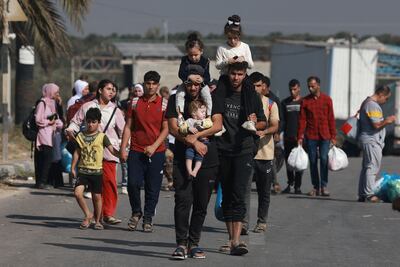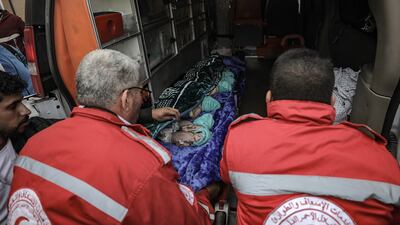Live updates: Follow the latest news on Israel-Gaza
Fifty Israeli hostages held by Hamas in Gaza in return for 150 Palestinians held in Israeli jails – those are the conditions so far for a four-day truce in the 46-day war in which more than 13,000 Palestinians have been killed.
The latest violence – the fifth major war in the densely populated coastal enclave since 2008 – began when Hamas launched a surprise attack into southern Israel, killing 1,200 people but also taking about 240 hostages.
Those hostages have become the focus of intense political controversy in Israel, where a growing protest movement says the government is not doing enough to secure their release.
Prime Minister Benjamin Netanyahu’s far-right allies however, including finance minister Bezalel Smotrich, had insisted that no aid reaches Gaza’s besieged population until hostages are released. But they are a small minority opposing the deal – only three out of 38 cabinet members opposed it.
In 2014, the last bloody war in Gaza that killed about 2,000 people, a ceasefire occurred 50 days into the conflict and led to the end of that war.
That seems unlikely now, given Israel’s goal of “wiping out” Hamas. But crucially in the current deal, Israel will be pausing air strikes for the duration of the truce. Hamas claims this will extend to a halt in Israeli air traffic over southern Gaza, and a halt in Israeli air traffic between 10am and 4pm in northern Gaza.
Here’s what you need to know about the current pause in fighting, set to begin on Thursday or Friday, depending on conditions being met.
What have Hamas and the Israeli government said about the Gaza truce?
First, the Israelis are adamant it is not the start of the end of the war – which they say will continue, until they “complete the elimination of Hamas”, according to a statement on the deal.
“At least 50 hostages – women and children – will be released over four days, during which a pause in the fighting will be held,” the Israeli government said.
Foreign passport holders, thought to make up about half of those held, including dual citizens, are not thought to be part of the deal.
Israel holds about 2,000 Palestinians in its jails without trial or publicly announced charges, according to Human Rights Watch.
Second, the deal is reportedly going to be accompanied by a surge in aid to Gaza, where families have been on starvation rations, short of drinking water and food for children.
Like the Israelis, Hamas insisted the truce did not mean they would renounce their war aims.
"As we announce the striking of a truce agreement, we affirm that our fingers remain on the trigger, and our victorious fighters will remain on the lookout to defend our people and defeat the occupation," a Hamas statement said.
What could a ‘surge’ in Gaza aid look like?
Gaza has been under total siege since the war began on October 7, with Israel even cutting water supplies to the area and, until recently, blocking fuel, leading hospitals to stop functioning.
About 1,200 aid lorries have reached Gaza since November 19, according to the UN, with many held up by Israel’s stringent conditions on aid – mainly the release of hostages – and inspections at Rafah on the Egypt-Gaza border. Gaza needs about 500 lorries of aid a day, the UN says, so about 15,000 lorries of aid have been needed since the border’s partial opening.
It is not yet clear what the aid surge could look like.
“If there is any pause in fighting, which is what we've been asking for, we would be able to deliver humanitarian aid more effectively," Farhan Haq, deputy spokesman for the UN secretary general, said on Tuesday.
Omar Shakir, Israel and Palestine director at Human Rights Watch, said that while “taking hostages is a war crime”, “blocking the delivery of life-saving aid and fuel until the release of hostages is a war crime that has put the lives of 2.2 million people at risk”,
How have world leaders responded to the Gaza truce?
US President Joe Biden and members of his administration kept their announcements focused on a diplomatic victory for his administration and the safety of the hostages. Welcoming the deal, Mr Biden said “Jill and I have been keeping all those held hostage and their loved ones close to our hearts these many weeks, and I am extraordinarily gratified that some of these brave souls, who have endured weeks of captivity and an unspeakable ordeal, will be reunited with their families.”

Reactions were still coming in on Wednesday morning, but European leaders were expected to strongly welcome the pause, particularly France, where President Emmanuel Macron told Mr Netanyahu earlier this month that Israel must rein in the level of destruction being rained down on Gaza. “These babies, these ladies, these old people are bombed and killed. There is no reason for that and no legitimacy. So we do urge Israel to stop,” he said, while also saying Israel had a right to defend itself.
On Wednesday, European Commission President Ursula Von der Leyen welcomed the deal, saying that “the European Commission will do its utmost to use this pause for a humanitarian surge to Gaza”.
How does this compare with past truces in Gaza?
The previous Gaza war, in 2014 – the deadliest before the current conflict – was brought to a close by an Egypt-brokered ceasefire 50 days into the conflict.
This time, a much bigger, multilateral effort has been required involving Qatar, Egypt, the US and the Palestinian Authority to bring pressure on the warring parties.
In 2014, Israeli forces had mounted a much more limited invasion of Gaza, pulling out after strong international anger and heavy casualties. But in the current war, Israelis have expressed the intention to completely destroy Hamas’s tunnel network, which spans large parts of the Gaza Strip, as well as eliminating Hamas, a goal that experts say could take months and months of fighting, and many more deaths.
The ceasefire led to the end of the previous war, but Israel only eased and did not end the Gaza blockade. UN secretary general Ban Ki-moon at the time cautioned that "any peace effort that does not tackle the root causes of the crisis will do little more than set the stage for the next cycle of violence".


